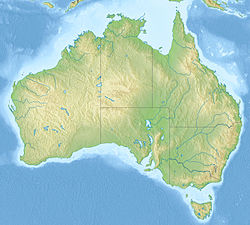Allaru Formation
Appearance
(Redirected from Allaru Mudstone Formation)
| Allaru Formation | |
|---|---|
| Stratigraphic range: Albian ~ | |
| Type | Geological formation |
| Unit of | Rolling Downs Group |
| Underlies | Mackunda Formation |
| Overlies | Toolebuc Formation |
| Thickness | Up to 700 m (2,300 ft) |
| Lithology | |
| Primary | Mudstone |
| Other | Siltstone, sandstone, limestone |
| Location | |
| Coordinates | 24°52′02.17″S 146°14′19.85″E / 24.8672694°S 146.2388472°E |
| Approximate paleocoordinates | 51°00′S 133°06′E / 51.0°S 133.1°E |
| Region | Queensland |
| Country | |
| Extent | Eromanga Basin |
The Allaru Formation, also known as the Allaru Mudstone, is a geological formation in Queensland, Australia, whose strata date back to the Early Cretaceous. Dinosaur remains are among the fossils that have been recovered from the formation.[1]
Fossil content
[edit]Possible indeterminate ankylosaur remains are present in Queensland. Indeterminate ornithopod remains are present in Queensland.[1]
Archosaurs
[edit]Dinosaurs
[edit]| Genus | Species | Location | Material | Notes | Images |
|---|---|---|---|---|---|
| Austrosaurus | A. mckillopi | Queensland | "Doral vertebrae [and possible] incomplete limb remains from several individuals"[2] | A Somphospondyli sauropod. [1] |  |
| Kunbarrasaurus | K. ieversi | Queensland | A parankylosaur. [1][3] |  | |
| ?Muttaburrasaurus | ?M. sp. | Queensland | [1] |  |
Reptiles
[edit]| Genus | Species | Location | Material | Notes | Images |
|---|---|---|---|---|---|
| Elasmosauridae | Indeterminate | Specimen number QMF2100, an articulated torso. Stomach cavity contains crustacean and fish remains as well as ~135 gastroliths.[4] | [4] | ||
| Notochelone | N. costata | [5] |  | ||
| Platypterygius | P. australis (=longmani) | [5] |  |
Fish
[edit]| Genus | Species | Location | Material | Notes | Images |
|---|---|---|---|---|---|
| Cooyoo | C. australis | Queensland | [6] | ||
| Flindersichthys | F. denmeadi | [7] | |||
| Pachyrhizodus | P. marathonensis, P. grawi | Two species known from both this and the Toolebuc Formation[8] | |||
| Richmondichthys | R. sweeti | An aspidorhynchid also found in the Toolebuc Formation[9] |
Invertebrates
[edit]| Genus | Species | Location | Material | Notes | Images |
|---|---|---|---|---|---|
| Eromangateuthis | E. soniae | Queensland | "Gladius" | [2] | |
| Goodhallites | G. goodhalli | [10] | |||
| Inoceramus | I. sutherlandi | Queensland | [11] | ||
| Mckenziephyllia | M. accordensis | [12] |
See also
[edit]- List of dinosaur-bearing rock formations
- Paja Formation, contemporaneous Lagerstätte in Colombia
- Sierra Madre Formation, contemporaneous fossiliferous formation of Mexico
- Santana Group, contemporaneous Lagerstätte in northeastern Brazil
- South Polar region of the Cretaceous
References
[edit]- ^ a b c d e Weishampel et al., 2004, pp.573-574
- ^ a b Fuchs, Dirk (2019). "Eromangateuthis N. Gen., a New Genus for a Late Albian Gladius-Bearing Giant Octobrachian (Cephalopoda: Coleoidea)". Paleontological Contributions. 2019 (21): 1–3. doi:10.17161/1808.29619. ISSN 1946-0279. S2CID 204976334.
- ^ Leahey et al., 2015
- ^ a b Colin R. McHenry; Alex G. Cook; Stephen Wroe (November 2005). "Bottom-Feeding Plesiosaurs". Science. 310 (5745): 75. doi:10.1126/science.1117241. PMID 16210529. S2CID 28832109 – via ResearchGate.
- ^ a b Kear, Benjamin P. (June 2003). "Cretaceous marine reptiles of Australia: A review of taxonomy and distribution". Cretaceous Research. 24 (3): 277–303. Bibcode:2003CrRes..24..277K. doi:10.1016/S0195-6671(03)00046-6 – via ResearchGate.
- ^ Lovisa Wretman; Benjamin P. Kear (April 2014). "Bite marks on an ichthyodectiform fish from Australia: Possible evidence of trophic interaction in an Early Cretaceous marine ecosystem". Alcheringa. 38 (2): 170–176. Bibcode:2014Alch...38..170W. doi:10.1080/03115518.2014.848692. S2CID 140194963 – via ResearchGate.
- ^ Bartholomai, A. (2010). "Revision of Flindersichthys denmeadi Longman 1932, a marine teleost from the Lower Cretaceous of the Great Artesian Basin, Queensland". Memoirs of the Queensland Museum. S2CID 189970876.
- ^ Bartholomai, A. (17 February 2012). "The pachyrhizodontid teleosts from the marine Lower Cretaceous (latest mid to late Albian) sediments of the Eromanga Basin, Queensland, Australia". Memoirs of the Queensland Museum – Nature. 56 (1): 119–148.
- ^ Bartholomai, A. (2004). "The large aspidorhynchid fish, Richmondichthys sweeti (Etheridge Jnr and Smith Woodward, 1891) from Albian Marine deposits of Queensland, Australia". Memoirs of the Queensland Museum. S2CID 195531265.
- ^ R.A. Henderson; W.J. Kennedy (2002). "Occurrence of the ammonite Goodhallites goodhalli (J. Sowerby) in the Eromanga Basin, Queensland: an index species for the late Albian (Cretaceous)". Alcheringa. 26 (2): 233–247. Bibcode:2002Alch...26..233H. doi:10.1080/03115510208619254. S2CID 130589426 – via ResearchGate.
- ^ Patrick Mark Smith; Timothy Holland (July 2016). "Cretaceous time capsules: remarkable preservation of fish and crustaceans inside the bivalve Inoceramus sutherlandi McCoy, 1865 from the Allaru Mudstone (late Albian), Eromanga Basin, Queensland". ResearchGate. doi:10.13140/RG.2.1.2264.9842.
- ^ John S. Jell; Alex G. Cook; Peter A. Jell (2010). "Australian Cretaceous Cnidaria and Porifera". Alcheringa: An Australasian Journal of Palaeontology. 35 (2): 241–284. doi:10.1080/03115518.2011.532322. S2CID 129707733.
Bibliography
[edit]- Leahey, Lucy G.; Molnar, Ralph E.; Carpenter, Kenneth; Witmer, Lawrence M.; Salisbury, Steven W. (2015). "Cranial osteology of the ankylosaurian dinosaur formerly known as Minmi sp. (Ornithischia: Thyreophora) from the Lower Cretaceous Allaru Mudstone of Richmond, Queensland, Australia". PeerJ. 3: e1475. doi:10.7717/peerj.1475. PMC 4675105. PMID 26664806.
- Weishampel, David B.; Dodson, Peter; Osmólska, Halszka, eds. (2004). The Dinosauria, 2nd edition. Berkeley: University of California Press. pp. 1–880. ISBN 0-520-24209-2. Retrieved 2019-02-21.


